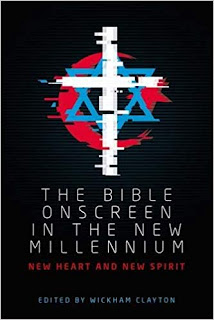Moses und Aron (1974): The Opening

Regular readers will know that over the last year, I've written various posts related to Straub and Huillet's 1974 film Moses und Aron without actually discussing the film itself very much. The last time I wrote anything on it directly was seven years ago, and even then, that was my dim recollections going back to the first few times I watched the film in 2002/03.
Having finally got myself a copy of last year's Grasshopper DVD release I re-watched it a while back, freshly armed with a greater understanding of the work of Schoenberg, Huillet and Straub, and so just wanted to add a few extra random observations to what I've written before. I've got a few to make so I've reduced them down into a few shorter posts. This one will deal with the films opening - indeed what happens before the adaption even really begins.
The work of Straub/Huillet work generally revolves around texts and even by their own standards they show especially strong fidelity to Schöenberg's libretto. The result of this is that the start of the film, those few moments before the first piece of music, take on a particular significance. The opening shot is of the pages of a German Bible open on Exodus 32:25-18. This is accompanied by a female voice reading the passage, also in German. The verses in question are those that describe wrestling power back from Aaron as he calls those faithful to God to his side and they proceed to pass through the camp killing those worshipping the golden calf.
As well as their concern for significant texts, Huillet and Straub are also concerned with layers of history. Here we see the two things combine in an interesting manner. The film the audience is about to watch is an adaptation of Schönberg's text, which has itself drawn from various traditions about Moses, themselves going back to the text of Exodus. Even then, source theorists would argue that the final text of Exodus was not written in Moses' lifetime but depended on at least four earlier texts/sources (the passage in question being a classic example of the Priestly source), which, in turn, drew on earlier traditions.1 Thus we have layer upon layer of history and texts in evidence.
Having said all that, it is significant that the passage in question is absent from Schönberg's opera. At the end of Act II Moses is left feeling rejected by the people's unfaithfulness. In the, admittedly unfinished, third act, Moses has somehow returned to power and has Aron held captive. Including this passage then at the start of the film not only draws attention from a key part of the story that will not otherwise be detected, but placing it so prominently at the start of the film, particularly in such a faithful adaption of the opera, really highlights it, as well as highlighting Schönberg's omission of it. It also aligns this film with another of their key themes from the rest of their work - certainly up to this point - that of power and different ways of looking at those forms of history that validate the powerful.
The credits follow - simple printed black text on a whitish screen, until just before the main part of the film begins a handwritten dedication flashes onto screen. This is to Holger Meins - a cameraman and member of the Red Army Faction who had died on hunger strike in prison. The Red Art faction was, as their title suggests, a far-left militant organisation, whom the majority would consider terrorists. Meins himself not only made the infamous short How to Produce a Molotov Cocktail, but had been involved in several fatal attacks. He and other RAF members were held in the maximum security Stammheim Prison and held in solitary confinement. Meins died in November 1974. Huillet and Straub's dedications had caused controversy before - there was uproar when they dedicated Chronik der Anna Magdalena Bach (1967) to the Viet Cong. This time around West German television refused to air Moses und Aron unless the dedication was cut.2
Incidentally I've previously tended to date this film as 1973, but as Meins death was not until November 1974, that is the earliest year we can assign it to, if not 1975. That would make it a fairly hasty dedication. Given that Meins is now known to have been involved in actual killings, I wonder if Straub and Huillet came to regret it. That said, it's possible that the film circulated before Meins' death without the dedication and that this was a later addition. I note that Wikipedia claim that the film was circulated in the US initially under the title Aaron and Moses.
=================
1 - For those interested in such issues, for around a century and a half the dominant theory in this area has been the Graf-Wellhausen/Documentary Hypothesis (although it owes a great deal to Graf's tutor Reuss). This posited that the Pentateuch was composed mainly from four earlier sources, Yahwist, Elohist, Priestly and the Deuteronomist. However, for much of the last century the Documentary Hypothesis has had the dubious honour of being the one the most scholars agree is worth proving wrong. Evangelicals tend, in the main, to hold to the idea of Mosaic authorship. Others hold to significant variations on the basic theory, usually enhancing the role of pre-existing oral traditions.
2 - Fairfax, Daniel (2009) "Great Directors: Straub, Jean-Marie & Huillet, Danièle", Sense of Cinema, September. Available online
https://sensesofcinema.com/2009/great-directors/jean-marie-straub-and-daniele-huillet/
Labels: Moses und Aron, Straub/Huillet













